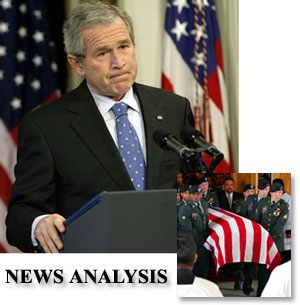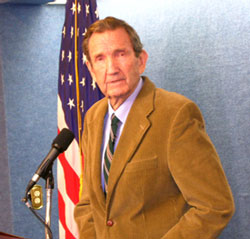- Bush has created comprehensive catastrophe across the Mid-East (UK Guardian, 12-14-2006)
- IRAQ: Hope fades as violence increases (FCN, 12-04-2006)
- Half of U.S. troops in Iraq say it’s time to come home (FCN, 03-14-2006)
- Most Iraqis doubt U.S. will ever leave (FCN, 02-14-2006)
- Minister Farrakhan’s warning to President Bush on Iraq (10-30-2002)

THE WHITE HOUSE (FinalCall.com) – President George W. Bush–searching for new strategies and tactics in Iraq “so that we can expedite success” there–may instead, be out of touch with both the reality in Iraq and the political mood in this country, his critics contend.
After insisting that troop levels in Iraq would be determined by the commanders in the field, Pres. Bush modified that position during a news conference Dec. 20, declaring that the recommendations of his military leaders are just one of many factors that will determine whether he orders thousands more American troops into Iraq. There are widespread published reports that the Joint Chiefs of Staff unanimously oppose sending more troops to Iraq without a clear mission.
Pres. Bush has, however, adopted some of the language advanced by his top military adviser to describe the deteriorating U.S. assessment of the war. “We’re not winning, we’re not losing,” Pres. Bush said in an Oval Office interview with The Washington Post Dec. 19, quoting Joint Chiefs of Staff Chairman Gen. Peter Pace. The assessment was a striking reversal for a president who, days before the November elections, declared, “Absolutely, we’re winning.”
“I think what the people want is–they want a couple of things,” he continued. They want to see Democrats and Republicans work together to achieve a common objective, and they want us to win in Iraq. A lot of people understand that if we leave Iraq, there will be dire consequences–in other words, if we leave before the job is done.”
Administration critics disagree sharply. “You will have less violence if you remove the U.S. troops immediately,” former U.S. Attorney General Ramsey Clark told reporters at the National Press Club Dec. 20.
“(Pres.) Bush does not seem to have understood the message of the mid-term elections,” said Andrew Burgin, spokesman for the Stop the War Coalition, according to The London Independent. “It is a fantasy to believe the American people will agree to increased numbers of American troops being killed in Iraq. It’s the same with (British Prime Minister Tony) Blair … the whole political class appears to be out of touch with how this war started, what is happening in Iraq now, and what the future holds.”

High level opposition to the President’s policy appears to be growing inside the Pentagon as well, according to published reports. Privately, the Joint Chiefs of Staff “have found their manhood,” a senior military officer told Time magazine.
“What has finally put some backbone in the Chiefs,” the magazine quotes a former senior officer who maintains good contacts with the Pentagon, “is that, to date, there has not been a realistic end state in Iraq identified that matches the realities on the ground. Tactics without a strategy are a recipe for failure.”
Top U.S. commanders also have worried that even a short-term troop increase might bring only a temporary respite to the violence–or none at all–while creating shortages of fresh troops for future missions.
“I’m not necessarily opposed to the idea, but what I want to see happen is when, if we do bring more American troops here, they help us progress to our strategic objectives,” Gen. George Casey, the top U.S. commander in Iraq and one of several generals who met with Defense Secretary Gates when he visited Iraq Dec. 21, told reporters during a news conference, according to The Army Times.
In another about-face, the President said he has ordered Defense Secretary Robert Gates to develop a plan to increase the troop strength of the Army and Marine Corps, finally heeding warnings from the Pentagon and Capitol Hill that multiple deployments in Iraq and Afghanistan are stretching the armed forces toward the breaking point.
“We need to reset our military,” said Pres. Bush in the interview. As recently as this summer however, his administration had opposed increasing military force levels.
Opposition to the President’s policies remains steadfast. “We have to care. If you love this country, in order to do right,” said Mr. Clark, “We’re going in the wrong direction. It seems like we’re trying to do everything wrong right now.
“We want to send more troops to Iraq. That is suicide for everybody involved. We want a bigger Army when we are spending more on arms than the rest of the world combined! How do you go on like that? Do you really think you’ll find a solution like that?”
Another vital component is the war’s cost. The administration is drafting a supplemental request for more than $100 billion in additional funds for the wars in Iraq and Afghanistan, on top of the $70 billion already approved for this fiscal year, according to U.S. officials. That would be 50 percent more than originally projected for fiscal 2007, making it by far the costliest year since the 2003 invasion.
Since Sept. 11, 2001, Congress has approved more than $500 billion for the wars in Iraq and Afghanistan, as well as for “terrorism-related operations” elsewhere. An additional $100 billion would bring overall expenditures to $600 billion and counting. Iraq war costs will exceed those for the Vietnam War which, adjusted for inflation, cost $549 billion, according to the Congressional Research Service.
Citizens must force Congress to challenge the administration on the war, said Mr. Clark. “I’m distressed about the political system. And I think that the only oversight on anything that we can reasonably expect at this time will come from the demand of the people themselves. When you look at the Democratic leadership, Nancy Pelosi, who’s a very attractive human being, she talks excitedly about the first 100 hours of the new Democratic Congress, and never mentions Iraq. How is that possible?
“The people are going to have to pay attention, stand up and demand, that, first, the government obey the Constitution and laws of the United States, which are being shredded; and acts in a way that is consistent with the avowed principles of the United States: freedom and justice for all!” said Mr. Clark.












